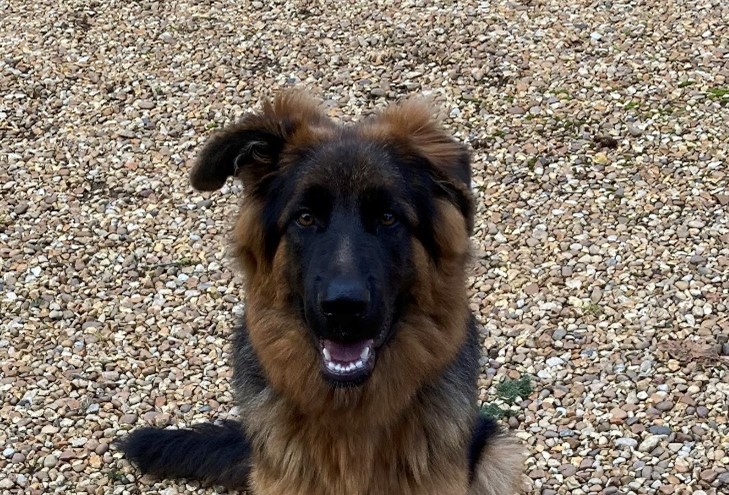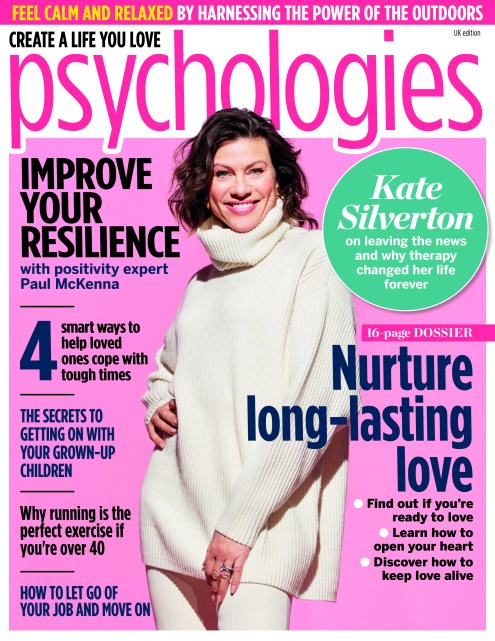The story of a Wannabe Therapy Dog – Part 2
Join Xaby and Ollie Coach, Marie Collet as Xaby trains to become a Therapy Dog. Xaby is doing well with his training so far, although it takes time and much patience on both our parts

Puppy Power
Xabier (Xaby) is now 6 months old, wow how the time flies!!! He has been such a busy pup since the first journal, learning something new everyday and getting up to mischief along the way! He and I have become accustomed to one another’s ways and our communication is growing stronger as each day passes. He is a loving pup with a very playful and cheeky sense of humour which at times is exhausting and extremely frustrating but, on the whole, it balances out well and we can’t now imagine life without him.
A month or so ago puppy classes were not available, so I decided to seek guidance from a professional trainer. He comes to the house once a month for an hour and sets tasks for us to practice, these are “basic training skills” and this is what Xaby and I have been working on so far:
This information applies to puppies between 8-18 weeks old
Voice – Use a growl voice for correction. Never physically reprimand your pup, it will only add to fighting back or fear of you and may prevent your growing puppy from wanting to come back to you. Use normal and calm voice tones when giving commands such as sit, stay, down etc … use a high-pitched happy voice when giving vocal praise and encouraging your puppy to you.
Socialisation/desensitisation – Accustom your puppy to as many different noises and sounds as possible such as traffic, school children, vacuum cleaner, mowers etc … Check with your vet regarding vaccinations before you take your puppy out on a lead. Let him meet people, by getting them to stand still and not reaching out with their hands. Let the puppy go to them voluntarily. Crouching down is less threatening to a puppy.
Lead work – Be calm and ensure that your puppy is calm when putting on the collar and lead. Gently encourage your puppy forward to walk by your legs, do not tug on the lead. As your puppy starts to walk forward give lots of vocal praise in a happy voice. Gently change direction so the pup focuses on you and so is ready for turns.
Exercise – 5 or 10 minutes only, twice a day should be enough; use the time to teach your puppy to walk properly and socialise. Play is the best exercise in the home/garden.
Sleep – Like human babies puppies also need a lot of sleep. Their behaviour gets worse the more tired they are, so make sure they get plenty of sleep periods.
Examination – Get your puppy use to being handled and examined. Check eyes, ears, teeth, feet and under the tail area and around the tummy every day to make sure your puppy accepts such handling which will make it easier for future examinations by your vet.
Correction of unwanted behaviour – If necessary, use a growl voice to correct any unwanted behaviour. Use LOTS OF PRAISE when naughtiness stops. Be careful not to praise at the wrong time which could lead to confusion, you must be fast to correct and fast to praise within 2 seconds.
Recall – Invite your puppy in a high pitched, happy voice (with rapid excitable hand claps if necessary) and immediately praise as soon as there is any movement towards you. Try not to force the puppy to you, let him come to you of his own free will.
Sit/stay – Start with a very short STAY period building up to longer. Use the growl voice tone if he looks like moving. Keep calm and start again if he moves out of the sit. Don’t forget to ‘“FREE” your pup when finished, I do this by throwing both my arms wide apart and saying “OK we’re done” and then use LOTS OF PRAISE again!
Gate/door training – Use the sit/stay when in front of the door/gate. If at the garden gate or at the front door that leads to a busy road, you could use a rope or 25ft puppy lead attached to a fixed collar, to ensure your puppy cannot escape.
Feeding manners – Do not interrupt the pup when he eats, this could set up a protective habit. Ensure he is getting plenty of correct nutrients, offer raw fruit and vegetable each day (research appropriate food for your breed).
Toilet Training – The excitement of getting a new puppy is often replaced with frustration as the reality of the hard work involved in toilet training sets in! By following these tips, you will speed up your puppy’s toilet training, and make life happier for the pup and all the family.
There are at least 6 specific occasions when you will need to take your puppy outside to toilet:
- As soon as he wakes up in the morning.
- Before going to bed at night.
- Every time he wakes up from a nap.
- After exuberant play.
- When you return home from being away from the house for any length of time.
- After eating.
In addition to these occasions, you should make sure your puppy is in your sight all the time, so that he can’t disappear somewhere to toilet without you knowing. Being in your sight will also allow you to see the signs of when he is preparing to toilet, so you can pop him straight outside.
It is especially important to remain with your puppy whilst he is outside. That way, you’ll know that he has toileted, and you are on hand to give him immediate praise. This will reinforce that toileting in the garden is the right thing to do. Very often owners make the mistake of putting the puppy outside alone for 10 minutes and then let them back in without knowing whether he has been or not. He may whine or scratch at the door to be allowed in because he’s lonely, the owner may praise him for coming back to the house but not know if he’s done his business and this is confusing as he’ll have forgotten what he’s been up to. He may think he’s being praised for coming back inside and that is not necessarily the behaviour that you want to train into him. The good deed done must be praised immediately or it won’t register with him.
It is very important to be lavish in your praise when he goes in the right place. On the other hand, never punish him for making mistakes. Accidents are bound to happen from time to time, and the only things you should do in these situations are:
MOP it up.
CLEAN the area thoroughly with an appropriate cleaning product that does not contain bleach or ammonia, as these ingredients leave a scent similar to that of urine and may confuse the pup.
REMOVE any faeces and put them in the garden area where you want your puppy to toilet, as this will help to guide him to the right place next time.
NEVER become frustrated or hit your puppy or show him the mess or push his nose into it. This will only make your puppy afraid and confused and will possibly cause him to go and hide to toilet which will obviously make matters worse.
Xaby is doing well with his training so far, although it takes time and much patience on both our parts. When we are training he does pretty much do as he’s asked i.e. sit, stay and come but when we are out and about where there are new smells and other distractions, then things can go quickly out of the window and he forgets all the good work we’ve done, but he’s still only young after all so I try not to get disheartened. From talking to other puppy owners this is quite normal and its only with more practice in different situations and as he gets older, he should become less distracted and more focused on me. Xaby is quite different to the last dog I had in that he likes to be close to me especially when I’m in the house where ever I go he follows which the majority of the time is sweet but when it comes to me needing the loo it can get a little bit much maybe! But he is a very loyal and loving companion.
At the end of his training session we always have a couple minutes of play. He particularly likes to chase his fluorescent oversized squeaky tennis ball and his frisbee! The only problem we now have is that once he’s caught them, he isn’t that keen to let them go again, so we are working on that bit at the moment. He’s just about getting to understand that if he doesn’t let them go then I can’t throw them again and so the game can’t continue so we are making some progress but it’s slow!
It’s particularly important not to allow the training sessions to go on too long and if you are getting frustrated or the pup is getting bored or noncompliant then stop and resume again later or the next day. You both must be feeling ready and in the right head space and energised for training to go well. Even 5-10 minutes is enough if it’s a good, concentrated, happy and successful session. Rather than 20 mins of trying to get the pup to pay attention, where everything feels hit and miss, there being no sense of flow or enjoyment and it is becoming a battle of wills.
As with all aspects of dog training, you must be consistent and patient and if you do find yourself getting in a bad mood, just walk away and give YOURSELF some TIMEOUT!
Marie Collett, Ollie Coach
My husband and I live on a farm in the Fens and we have three grown boys. My intention for the past few years has been to open up my home as a day centre for children of varying ages and abilities for them to get the opportunity to enjoy and benefit from life in the open countryside for both their emotional and physical wellbeing. So, I trained to be an “Ollie Coach” so that I could help the children be all they can be. I also wanted to introduce a therapy dog into the equation to help me in my quest and bring some extra joy, comfort and unconditional love to the venture.
To get in contact with Marie, email Marie.collett@ollieandhissuperpowers.com
To find out more about Ollie and his Super Powers and how to become an Ollie Coach go to www.ollieandhissuperpowers.com
Caroline Chipper
Director
Co founder of Subconquest Ltd, that trades as Ollie and his Super Powers. My many years of commercial experience is being put to good use managing the business side of Ollie, including working with our Ollie Coaches, and managing our contracts. In everything we do its about making a difference to those we work with. To find out more go to https://www.ollieandhissuperpowers.com/pages/about-us


